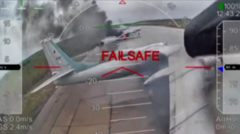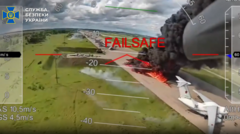In a bold military operation over the weekend, Ukraine targeted Russian air bases, destroying critical aircraft and aiming to send a strong signal to President Putin regarding the risks of prolonging the war and the need for serious negotiations.
Ukraine's Strategic Drone Assault: A Message to Putin

Ukraine's Strategic Drone Assault: A Message to Putin
Kyiv's recent attacks on Russian air bases aim to shift the dynamics of the ongoing conflict and emphasize potential risks for Moscow.
In a significant escalation of hostilities, Ukraine launched one of its most daring military operations by striking Russian air bases deep within its territory. The assault involved deploying drones from semi-trucks, targeting sites ranging from eastern Siberia to locations near Russia's western border. This maneuver is seen as a clear attempt to disrupt Russian military capabilities and to demonstrate that the continuation of the war could come with severe consequences for Moscow.
Recent months have witnessed Russian President Vladimir Putin projecting confidence in the ongoing military campaign, claiming substantial victories and a perception that his forces are close to dominating Ukrainian defenses. However, Ukraine's latest attack on the weekend serves as a counter-narrative, revealing vulnerabilities in Russia's defense posture.
By damaging a variety of aircraft, including strategic bombers that carry nuclear capabilities, Ukraine intends not only to diminish Russia's aerial strength but also to instill apprehension within the Russian leadership regarding the costs of sustained military aggression. Analysts suggest that the timing of this attack, occurring just before a new round of peace negotiations, was no coincidence. The offensive appears designed to leverage Ukraine's upper hand and urge Russia towards meaningful dialogue.
James M. Acton, co-director of the nuclear policy program at the Carnegie Endowment for International Peace, commented on the potential impact of these actions, stating the operation aims to convey to Russia that there are significant reasons for reconsidering its negotiation stance, despite Ukraine's current inability to seize territory on the battlefield. This strategy underscores a shift in the war's dynamic, advocating for a reconsideration of military tactics and strategic calculations by both nations involved.
Recent months have witnessed Russian President Vladimir Putin projecting confidence in the ongoing military campaign, claiming substantial victories and a perception that his forces are close to dominating Ukrainian defenses. However, Ukraine's latest attack on the weekend serves as a counter-narrative, revealing vulnerabilities in Russia's defense posture.
By damaging a variety of aircraft, including strategic bombers that carry nuclear capabilities, Ukraine intends not only to diminish Russia's aerial strength but also to instill apprehension within the Russian leadership regarding the costs of sustained military aggression. Analysts suggest that the timing of this attack, occurring just before a new round of peace negotiations, was no coincidence. The offensive appears designed to leverage Ukraine's upper hand and urge Russia towards meaningful dialogue.
James M. Acton, co-director of the nuclear policy program at the Carnegie Endowment for International Peace, commented on the potential impact of these actions, stating the operation aims to convey to Russia that there are significant reasons for reconsidering its negotiation stance, despite Ukraine's current inability to seize territory on the battlefield. This strategy underscores a shift in the war's dynamic, advocating for a reconsideration of military tactics and strategic calculations by both nations involved.























